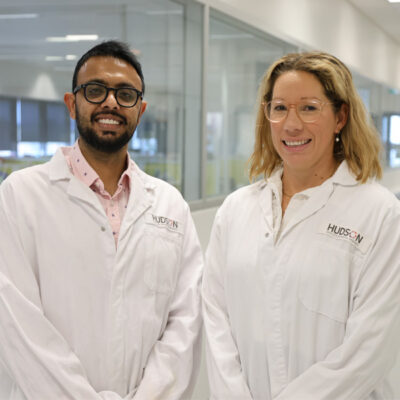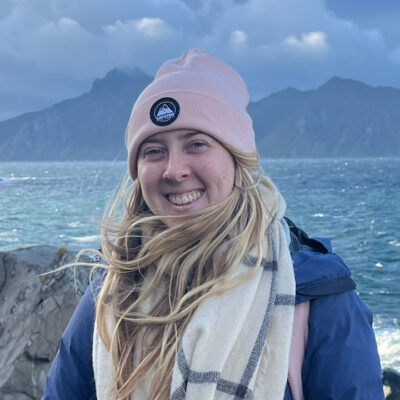Hudson Institute scientists awarded Young Tall Poppy Awards
By Hudson Institute communications
Two Hudson Institute scientists, Dr Michelle Tate and Dr Erin McGillick, have been presented with prestigious Victorian Young Tall Poppy Science Awards in recognition of their outstanding research achievements and community engagement.
Dr McGillick, a fetal and neonatal physiology researcher, and Dr Tate, a virologist and immunologist, received the awards at a ceremony in Melbourne Thursday evening, 15 November.
This year, two of the 11 recipients of the Victorian Young Tall Poppy Science Awards were Hudson Institute of Medical Research scientists.

Dr Erin McGillick
Research Field | Neonatology/Obstetrics and Gynaecology
Dr McGillick’s work aims to find treatments that will improve outcomes for the most vulnerable babies in the neonatal intensive care unit. Her research has focused on the effects of preterm birth, gestational diabetes, maternal obesity and fetal growth restriction on development of the fetal lung.
More recently, Dr McGillick has been investigating mechanisms and interventions to improve the transition from fetal to newborn life in complicated pregnancies.
Dr McGillick is an NHMRC Peter Doherty Early Career Research Fellow in the Fetal and Neonatal Health research group at Hudson Institute. She received her PhD from the University of South Australia in 2016.
As well as Dr McGillick’s research achievements, her love of science has led to in involvement in interactive science exhibition Science Alive! events to engage school children in science, a science curator at an international anatomy exhibition and the Fresh Science competition, where she won an award for best science communication by limerick.

Dr Michelle Tate Research
Field | Innate Immunity and Infectious Diseases
Every year, 5-10 per cent of our community will be infected with influenza. With a severe flu season, this can jump to 30-50 per cent. The influenza virus can mutate very easily, which makes preventing infection with effective vaccines more difficult.
Dr Tate’s research examines the interactions of the influenza virus with the host and the effectiveness of treatments that target host molecules, rather than the virus. Her research has identified new ways in which influenza causes severe disease. This approach is laying the ground work for facilitating new influenza drug development.
Dr Tate is an NHMRC Career Development Fellow at Hudson Institute, where she leads the Viral Immunity and Immunopathology research group. She received her PhD from the University of Melbourne in 2010.
Dr Tate actively communicates her enthusiasm for science widely, including though Girls in Science Breakfasts, a wide range of media, and at the Melbourne Town Hall public event Vaccination Café.
About the Young Tall Poppy Science Awards
The awards were established in 1998 by the Australian Institute of Policy and Science (AIPS) to recognise the achievements of Australia’s outstanding young scientific researchers and communicators.
Over the last 20 years, more than 500 young scientists have been presented with Young Tall Poppy Science Awards across Australia.
Young Tall Poppy Science Award recipients also participate in education and community outreach programs in which they become role models to inspire school students and the broader community about the possibilities of science.
In this article
About Hudson Institute
Hudson Institute’ s research programs deliver in three areas of medical need – inflammation, cancer, women’s and newborn health. More
Hudson News
Get the inside view on discoveries and patient stories
“Thank you Hudson Institute researchers. Your work brings such hope to all women with ovarian cancer knowing that potentially women in the future won't have to go through what we have!”





